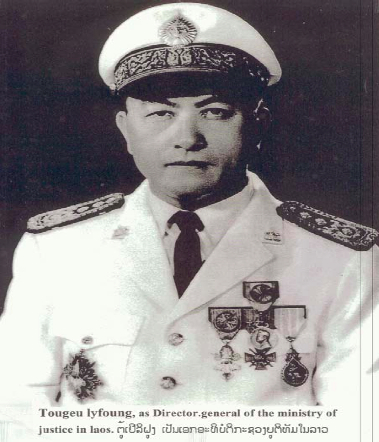Tou Geu Lyfoung (Tub Ntxawg Lis Foom)
Phaya Tougeu Lyfoung was the seventh of ten children born to Va Yang [Vab Yaj], Ly Foung’s first of four wives.* Tougeu was born in the district of Nong Het in March 1921. Ly Foung, Tougeu’s father, first instilled the value of education upon him and his brothers by hiring a private tutor to instruct them in Lao. Later, Tougeu, Toulia, and Touby attended primary school in Xieng Khouang where they learned French.
From Xieng Khouang, Tougeu went on to obtain a baccalaureate at the secondary school in Vinh and, then, a two-year degree in agriculture at Hanoi. From 1957 to 1960, Tougeu would obtain further training in law at the Ecole Nationale France Outre Mer in Paris. In the meantime, however, Tougeu returned from Hanoi to Laos on the eve of the Japanese occupation to find himself on the side of the French. He became an anti-Japanese resistance leader, serving in the battlefield next to Free French officers like Maurice Gauthier, Jean Sassi, and Andre Chenivesse from 1945-48.
Tougeu’s collaboration with the French was fully recognized by the French government in 1998 when he was awarded the distinguished French medal of honor, being inducted as chevalier de la Legion d’honneur. Tougeu’s brother, Touby, had already gotten this medal in 1945. After Tougeu’s immigration to France in 1975, Lieutenant-Colonel Chenivesse felt that Tougeu deserved equal recognition and led the investigative work to petition the French government to extend the same honor to him.
Following the conclusion of World War II when Laos became an independent state, Tougeu Lyfoung found the honor as well as the heavy burden of national leadership upon his shoulders. Being noted among the only half dozen or so Laotian intellectuals with his level of education, Tougeu was immediately summoned by His Majesty King Sisavang Vong to be an advisory member of the King’s Council. Tougeu felt enormously honored for he was the first minority called to occupy a position that had traditionally been the exclusive preserve of royal princes, and he served the king dutifully from 1948 to 1951. From this initial appointment, Tougeu Lyfoung went on to occupy many distinguished positions in the Royal Lao government some of which included being provincial representative (1951-55), public prosecutor (1956-57), and general director of the Ministry of Justice (1960-75). Because of his educational pursuit in different places, Tougeu Lyfoung was fluent in many languages including Hmong, Lao, French, Vietnamese, and English. Tougeu Lyfoung died in 2004.
Source:Â http://hmongstudies.org/HmongHistoricalFiguresPresentation.pdf
Mai Na M. Lee
Assistant Professor of History/Asian American Studies
University of Minnesota, Twin Cities
Department of History
